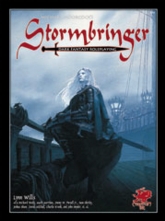What a surprise—Michael Moorcock didn’t like Star Wars either when it came out:
This sort of implicit paternalism is seen in high relief in the currently popular Star Wars series which also presents a somewhat disturbing anti-rationalism in its quasi-religious ‘Force’ which unites the Jedi Knights (are we back to Wellsian ‘samurai’ again?) and upon whose power they can draw, like some holy brotherhood, some band of Knights Templar. Star Wars is a pure example of the genre (in that it is a compendium of other people’s ideas) in its implicit structure — quasi-children, fighting for a paternalistic authority, win through in the end and stand bashfully before the princess while medals are placed around their necks.
Star Wars carries the paternalistic messages of almost all generic adventure fiction (may the Force never arrive on your doorstep at three o’clock in the morning) and has all the right characters. it raises ‘instinct’ above reason (a fundamental to Nazi doctrine) and promotes a kind of sentimental romanticism attractive to the young and idealistic while protective of existing institutions.
Look, buddy, if you’re going to bag on Star Wars, you have to be doing it for the right reason.
Star Wars, alongside Lord of the Rings, makes two genre-defining things that Moorcock hates (that is, considers “crypto-Stalinist”) which are are orders of magnitude more popular than Moorcock’s own writing. Oh, also “C. S. Lewis, Frank Herbert, Isaac Asimov and the rest.” I’m starting to detect a pattern.
Update: Moorcock (or the article transcriber) spells “Tolkien” incorrectly throughout his essay. So maybe he’s talking about a totally different Tolkien. Er, “Tolkein.”
